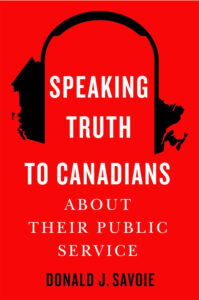“If accountability cannot be fixed, government operations cannot be fixed.” Savoie, p. 246
This is the theme of Savoie’s latest and, maybe, his most excoriating analysis yet of the federal government and public service. His assessment of public service failures and the lack of accountability and results is relentlessly pointed. It is an essential and sometimes bleak read.
Savoie’s contribution to understanding how public services work is legion. Best known for Governing From the Centre, his 1999 book which established PMO and PCO as the true locus of decision-making in Ottawa, Savoie has written some two dozen books on government and life and personalities in his home province of New Brunswick. Savoie draws on many of them to revisit the trends in public service management over the years to ask whether anything has changed for the better. His conclusion: it’s worse.
His list of challenges and shortcomings include: “the failure to control growth in the federal public service, the inability to establish performance, prime ministers having to resort to bolts of lightning to control spending, an unwillingness to ask penetrating questions about government operations, too many decisions being delegated up rather than down, and the government’s inadequate accountability requirements.” (p. 248)
That’s a pretty comprehensive indictment. And one which he points to both politicians and senior public servants aiding and abetting.
Savoie delineates two types of public servants in Ottawa, what he labels “poets and plumbers”. Poets are the policy, advisory, strategy, communications, administration and back office types; plumbers are the front-line operational and service delivery types. He finds that some 60 per cent of federal public servants can be classified as “poets” who do not actually deliver services to Canadians. This bifurcation in public service roles leads him to wonder if there are, in fact, two public services combined within one. Their values and behaviours are different from each other’s; their public servant experiences radically different from each other’s. Plumbers are the “poor cousins” in the public servant hierarchy who “know first-hand that Canadians see the federal government is not up to standard in delivering programs.” Poets, meanwhile, are more highly valued in Ottawa due to their political and policy skills in navigating and advising the Centre and decision-making branch of government. Poets are the ones to become deputy ministers, not plumbers, in Savoie’s telling. “We need to recognize that there are now two public services…”, he declaims.
Savoie cites expansive – 25 per cent – public service growth in less than ten years, questioning forcefully whether so many more public servants are needed and can be justified. More government is clearly not better government, in his view. Despite this explosive growth, particularly during COVID-19, the service delivery quality has not improved and, in fact, has deteriorated in important areas, such as passports and airports.
Adding additional layers of senior management comes in for particular attention by Savoie after reports and commitments by public servants and politicians to “de-layer” and empower managers directly. He points out that not one of the 29 reports of the Clerk of the Privy Council, the federal government’s top public servant, has ever touched upon the issue. As an example, he notes that with Treasury Board Secretariat, the government’s central agency for spending control, there are twice as many public servants dedicated to internal services than to expenditure management.
The rationale for more public servants is not more public service but meeting the needs of a more complex and demanding political and policy environment, particularly in meeting demands from the Centre or “upstairs” as he calls it. Trouble is, that’s not leading to better service and accountability for government spending and decisions.
This all adds up to a machinery of government overload, for Savoie. “Rather than introduce measures to simplify the machinery of government, in recent years, governments have done the opposite. They have made it bigger, adding new requirements and new layers, making accountability more impenetrable.” (p. 41)
Savoie knowledgeably weaves past public service reform attempts to explain and gain insight into contemporary situations. Applying private sector approaches to expenditure and people management (a theme of his 1994 book Thatcher, Reagan, and Mulroney: In Search of a New Bureaucracy) did not work in his view. “The wrong place to look” for solutions, he writes. Part of this is, most obviously, a fundamentally different role in providing public versus private goods and services. Government is not a corporation and shouldn’t necessarily behave like one. But Savoie persuasively argues that the true failure was an inability or unwillingness to adjust accountability instruments and processes to these approaches. “The inability to update accountability requirements has contributed to the degradation of the public service”, he concludes. (p. 221)
At the heart of Savoie’s critique of the federal public service is accountability; the “unresolved issue”, he calls it. But in expounding on this, he underlines the importance of culture and values to explain behaviour within the public service. His most compelling allegory is of “Plato’s Cave”, what we would call alternative reality today. An escaping prisoner discovers a whole new world outside the confines of the cave but decides that life in the cave is actually more secure. This helps explain how public servants find comfort and refuge in what they know and do now – the Ottawa bubble – rather than encouraging fresh thinking on how to deliver better policies, programs, and services. His example of “bolts of lightning” from political masters for expenditure and program and service reviews as a compelling example of how change really happens. It does not originate within the public service itself, despite them being accountable for the actual management of government.
This political scientist is not afraid of speaking his own truth to power. He questions notably why it is that former Clerks, who are also Head of the Public Service, only seem to discover what is wrong with the public service after they retire. He doesn’t disagree with their analysis necessarily, but legitimately queries why (or if) they didn’t act to fix matters while they were in charge. It’s a reasonable question since if they can’t improve things while in power, who can?
This leads to Savoie’s overriding question embedded in the book’s title. What do Canadians want in, and from, their federal public service, he asks. To answer this, Savoie proposes a royal commission on the famous Glassco Commission on Government Organization of the 1960s, on the role of the public service. He admits this is controversial for some, and perhaps historically dated as a solution, and surfs against contemporary Ottawa opinion, but argues reform will not occur if left to the public service and politicians themselves. Status quo incentives are too strong, he writes. But there are big and fundamental questions that need to be asked about how government is run and what can be done better. Outside perspectives are both needed and essential if any change is to happen. A royal commission would, in Savoie’s telling, “open the windows of government operations so that federal public servants can see out and other Canadians can see in.”
There is little doubt Professor Savoie’s book will be received with open arms by official Ottawa, bureaucratic or political. Even though many inside government will concur with the diagnosis, few feel it can be acted upon. It’s too hard, won’t work, or not realistic given political realities, are all likely responses. Still, Savoie’s latest contribution to Canada’s public service understanding, as his career closes, he admits, may be his most compelling. By putting citizens first, Savoie effectively eliminates opposition arguments. After all, why would Canadians want this to be the norm for our public service? In doing so, he shines a light on both the problem and the barriers itself to change – the public service and politicians who work in it and benefit from it.


